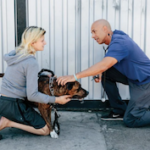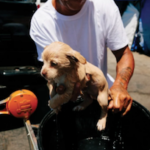Dr S. Brings His Healing Presence to Pets of the Unhoused in L.A.
Dr S visits many of the LA neighborhoods that are composed of tents or rough structures on the sidewalk that sit amid heaped wooden pallets, old furniture and trash. He spots a dog relaxing nearby one of the structures and introduces himself. “Hi, how are you?” I’m a veterinarian, Dr. Kwane Stewart, and I offer free pet care to people experiencing homelessness.” He gestures at the dog. “Can I examine your pet?” After some initial suspicious glances and reluctance, Dr S. gets a nod and he kneels, pulls out his stethoscope and goes to work.
The Skid Row streets of LA are populated by the nation’s largest concentration of homeless people who are not staying in a shelter. Like many similar neighborhoods in major cities across the country, it is ‘an unrelieved landscape of despair, poverty, mental illness and addiction. But there is also love, especially the love of pets.’
Across the nation, 10 to 25 percent of the people who are homeless keep pets. Cats sit on sleeping bags, pit bulls, scruffy terriers and mutts trot alongside filled shopping carts, and chihuahuas ride in bicycle baskets and the laps of people who themselves are in wheelchairs. Various local groups and volunteers help the owners of these animals care for them, with weekly and monthly clinics, mobile spay and neuter vans, handouts of flea meds and food.
Dr. Stewart usually worked solo, walking the streets and looking for animals and people in need. He stated, “Maybe it’s because when I began this work, it wasn’t uncommon to find a pet that had never received care,” he says. “Everyone I met looked at me as if I’d just dropped out of the sky.” He wore scrubs to identify himself, carried a bag filled with meds, vaccines and syringes, nail trimmers, and he did whatever he could, free of charge. Initially, like many others, he questioned why homeless people had animals to begin with—if humans couldn’t take care of themselves, how could they be responsible for pets? And yet they were. In fact, numerous academic studies over the years have revealed the vital role pets play in the lives of unhoused men and women—providing structure, purpose, meaning and love.
According to Dr Stewart, “Pets were a lifeline to the people I met,” he says. “Most of them were great pet owners. They did remarkably well with the resources they had, and made sacrifices for them well beyond what you or I would. The bond between them was on a completely different level. They needed each other.”
“Always wanted to be a Vet.”
Stewart grew up with dogs, loved them and science. He knew from an early age that he would become a veterinarian. It was an unusual ambition for a Black track star in Albuquerque. ‘Once, a coach asked about his future plans and laughed with disbelief when he heard Kwane’s educational goal. The coach said, “I’ve never met a Black vet.” Stewart goes on, “At the time I didn’t think much about it. But here’s the thing: He was Black himself.” Decades later the number of African American veterinarians is still so small the Bureau of Labor Statistics has reported that it might as well be zero.
It started as a secret hobby.
For five years, his efforts were a kind of secret hobby that he says even his family didn’t know about. These days he’s founding a new veterinary practice in San Diego and writing a book about his experiences on the street. Last year he started a nonprofit, Project StreetVet, raising money on GoFundMe to cover the cost of treating pet medical problems beyond the scope of a sidewalk exam. He has occasionally volunteered with larger organizations assisting people who are homeless. However, he says “there are probably more efficient ways I could spend my time,” he likes doing it his way.
Source:





